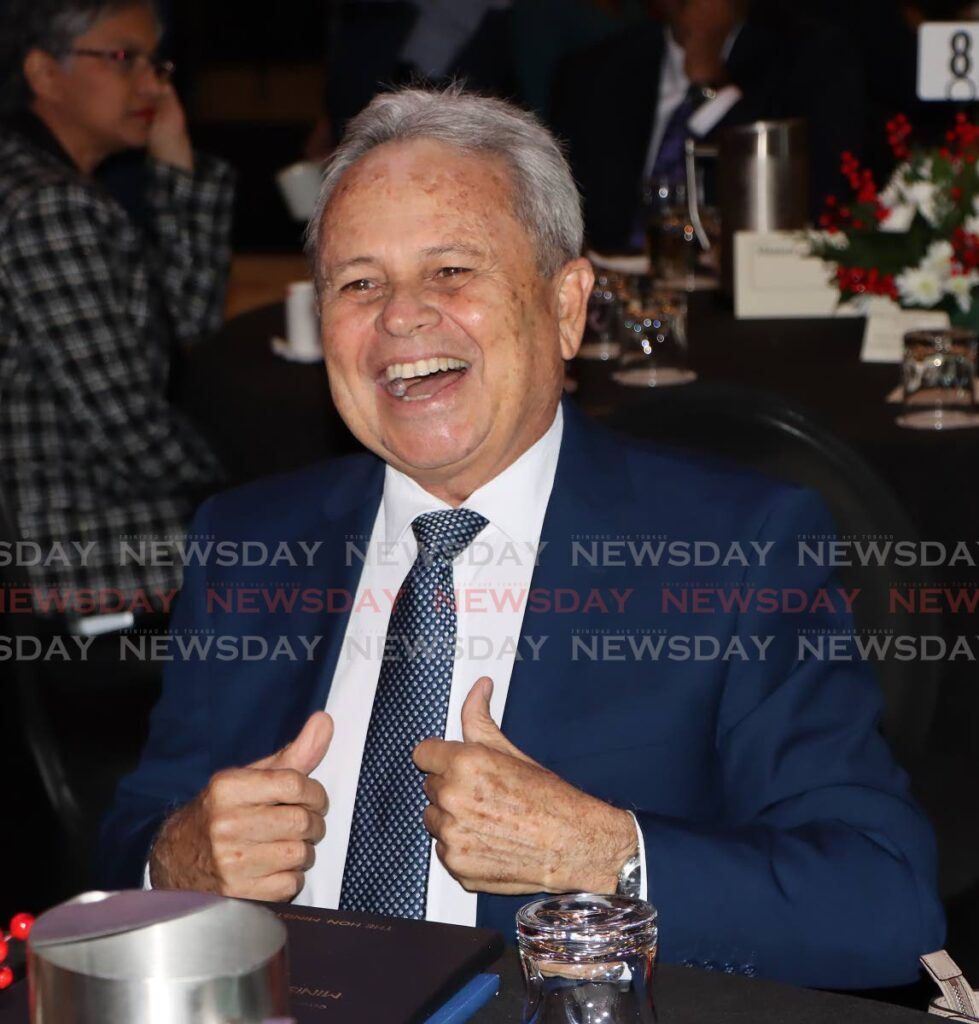Business community supports TTRA but urges: 'Address PSA's concerns'

UNITED by the potential of a transformational, efficient and modern tax-collection regime, business chambers welcomed the Privy Council’s decision on September 16 to allow the new TT Revenue Authority (TTRA) to proceed.
Some, however, have addressed the Public Services Association (PSA) concerns raised in its unsuccessful appeal to the UK-based Privy Council – TT’s final appellate court – to prevent the TTRA from becoming operational.
The PSA acknowledged the Privy Council’s decision in a statement issued shortly afterwards but said the government owed the public servants more information about their future.
It cited particular concerns about Section 18 of the TT Revenue Authority Act, which deals with their future employment.
The PSA said although it welcomed the judgment for validating its concerns it remained dissatisfied with the government's handling of the matter.
It argued civil servants are "being demanded to exercise an option pursuant to Section 18 of the TTRA Act without pertinent information to inform their choice."
It said it plans to meet with BIR and CED workers to discuss the next steps and reinforce its stance that: "No information equals no option.”
Section 18 provided the basis of the PSA’s legal challenge. The passage gave BIR and CED staff three months to decide whether they wanted to be absorbed into another state agency or transferred to the new authority.
The PSA's initial legal challenge aimed to address these issues and protect public officers' rights.
Although the Privy Council confirmed the constitutionality of the TTRA, it acknowledged some of the PSA's concerns.
For instance, the judgment highlighted ambiguities in the act over the division of functions and the potential for abuse of power, particularly related to the Enforcement Division.
The Privy Council noted criticisms of the act's provisions, including the unclear definition of "enforcement" and the risk of political appointees exerting coercive powers.
The judgment pointed out that while some issues were identified, they were not resolved in this appeal and could be subject to further legal scrutiny.
Before the ruling on September 16, the TT Chamber of Industry and Commerce (TT Chamber) released its recommendations to the Ministry of Finance ahead of the 2025 budget presentation.

Among them, the TT Chamber called for the implementation of the TTRA, saying, “We commend the Government’s efforts to improve the efficiency of the Board of Inland Revenue (BIR) and Customs and Excise Division (CED) through the proposed establishment of the TTRA."
It pointed out that other Caribbean countries – Jamaica, Barbados and Guyana – have introduced revenue authorities, so: "It is no surprise that TT is pursuing the implementation of a TTRA.”
The TTRA combines the operations of the BIR and the CED into a single authority, designed to streamline tax administration, improve efficiency and strengthen revenue collection by using technology, improved management practices and oversight. It is intended to centralise and modernise the revenue-collection system.
The TTRA is authorised to introduce new methods for compliance and audits, unlike its predecessors, which were often constrained by bureaucracy.
The government has said it is also intended to reduce duplication of human and other resources and enhance co-ordination between customs and domestic tax collection.
TTRA employees will not be considered public servants and are subject to private-sector employment conditions, following a separate framework for salaries, benefits and dispute resolution.
The semi-autonomous authority will be governed by an independent board of directors insulated from direct political control.
According to the act that governs it, the Minister of Finance can only issue broad policy directions and has no authority to interfere with the body’s day-to-day operations or individual tax cases – a point Finance Minister Colm Imbert stressed repeatedly in the Senate on September 17.

He blasted the Opposition's assertions to the contrary, describing them as “fearmongering.”
The chambers responded to the Privy Council’s decision on September 16 in a more welcoming tone.
Attorney Martin George, head of the Tobago Business Chamber, said he understood the judgment but said the PSA has valid concerns about the workers’ salaries, conditions, transfers, and duties, previously protected by the union and the Constitution.

“But the way this new management of the TTRA has been rolled out, there is the opportunity for persons to opt out of their public service careers and opt into the TTRA,” George said.
“That is where I think the Privy Council would have found favour with the argument of the State (that it isn’t) unconstitutional in that sense…
“It’s quite an interesting scenario, but at the end of the day, if it is something that is going to promote greater efficiency and effectiveness in terms of the government’s revenue collection and the way that we are able to do business in TT, then, of course, it is a step in the right direction.
“But, of course, one can fully understand the concerns and fears of public servants (about) their tenure, their years of service, etcetera.
“These are real and tangible concerns that ought not to be dismissed lightly. Maybe we can have a bit more of a conciliatory approach from the government to achieve some sort of rapprochement with the union and its members so you have a seamless transition.
“This contentious way of treating with everything in TT is really not conducive to good business or efficient government…”
President of the Couva Point Lisas Chamber of Commerce Deoraj Mahase told Newsday he is looking forward to the successful implementation of the TTRA “with a transition period with minimal negative impact to everyone, including the present employees in the various areas which will transfer under this new body.”

He said there is an opportunity to adjust policy and update systems to a more modern standard of revenue collections and accountability of revenue-earning by all citizens over 18.
“However, the TTRA must understand that expectations are high, regarding their responsibility and accountability to the public,” Mahase said.
He said the TTRA should “implement measures to reduce delays of the present systems and reimbursements, and (introduce) standardisation of charges.
"Overall improvements for the business community, individuals, consumers and government must be part of their focus.”
About the PSA's legal challenge
The Privy Council effectively quashed the PSA's second appeal after a legal challenge against the constitutionality of the TTRA after the TTRA Act was passed in December 2021 and proclaimed by President Christine Kangaloo in April 2022.
In July 2022, Terrisa Dhoray, a customs officer, filed a lawsuit on behalf of the PSA challenging the legislation. The case was dismissed by a High Court judge in November 2023, as was Dhoray's first appeal in May.
On September 16, shortly after the ruling, the PSA released a statement saying although the Privy Council has ruled that the TTRA was not unconstitutional, “it does not, in any way, sanitise the government’s atrocious, egregious, disrespectful demands/acts against public officers attached to the BIR and CED of the civil service...
“For example," the PSA said after the ruling, "one of the options is to voluntarily separate from the civil service without being given the terms of the voluntary early separation plan.
“Or, they are told they can opt to transfer, either to the TTRA or other parts of the civil service on no less favourable terms and conditions, but who determines what exactly equals ‘no less favourable terms and conditions'?
"It was because of this unacceptable, atrocious treatment of these officers that led to the PSA’s challenge of this law, both in the public interest, and to ensure the rights of these officers to be treated with dignity and respect are thoroughly defended."
"We therefore continue to demand that the Government treat with public officers with dignity and respect and meet with the PSA to settle on all issues as it pertains to the implementation of Section 18 of the TTRA."
The PSA said it felt "vindicated" by the Privy Council despite the ruling.
"(Though) not successful, the judgment has confirmed and agreed with some of our worst fears and suspicions.
"The PSA, therefore, calls upon Minister of Finance, Colm Imbert, to pay careful attention to the concerns expressed by the Privy Council in its judgment because it is a citizen’s torchlight on the restrictions that apply to the TTRA."
The PSA, citing an excerpt from the judgment, noted that the Privy Council was sceptical about the allocation of powers within the TTRA, noting the risk of non-public officers exercising coercive powers, which could lead to abuse.
The PSA highlighted paragraph 36 of the judgment, which points out the unclear and circular definition of "enforcement" in the Act.
It mentions that the powers of public officers in the Enforcement Division are not well defined, raising concerns about the potential for misuse.
The PSA noted that the Privy Council referred to a concession made by Minister Colm Imbert, acknowledging that the definition of "enforcement" was confusing and "circular."
Though the Privy Council did not fully address the PSA's concerns about the weaknesses in the law, it left open the possibility of future legal challenges regarding the interpretation of "enforcement" and the division of powers within the TTRA.
The PSA concluded, saying it had fulfilled its duty to protect against government overreach and would continue to advocate for its members.

Comments
"Business community supports TTRA but urges: ‘Address PSA’s concerns’"